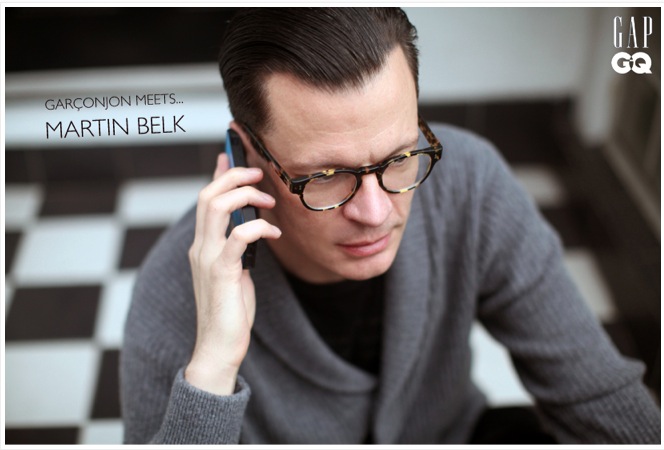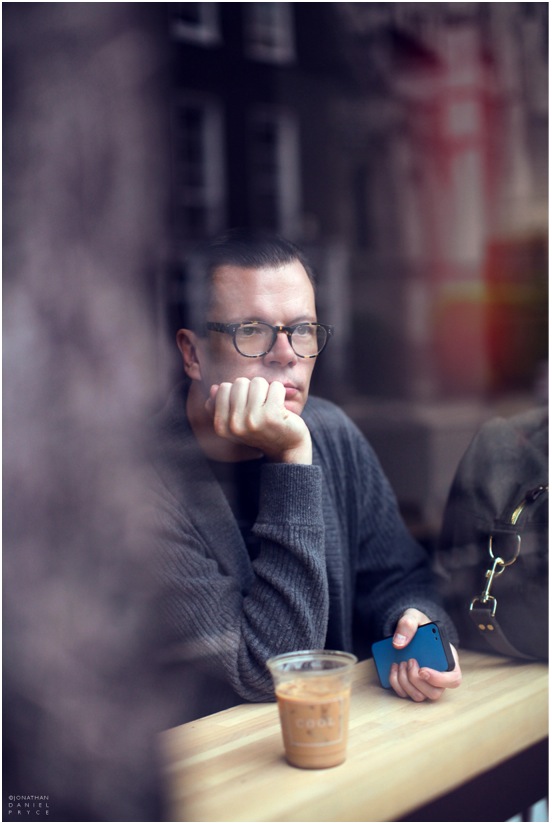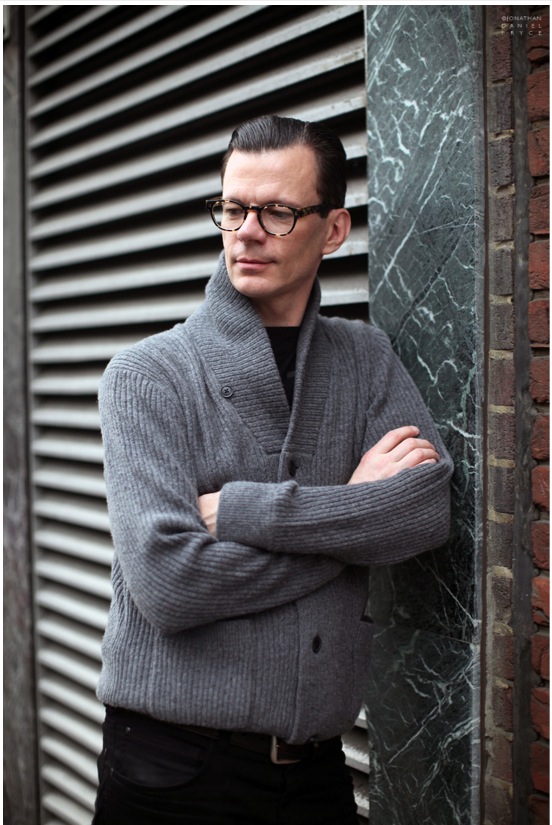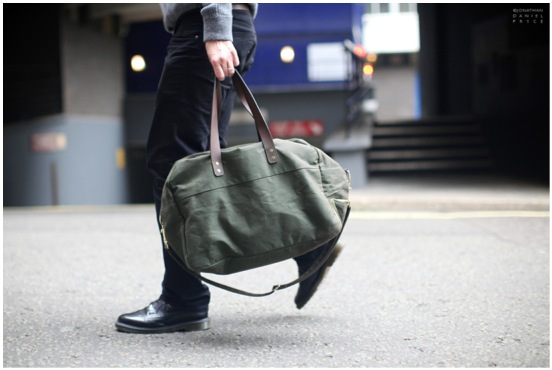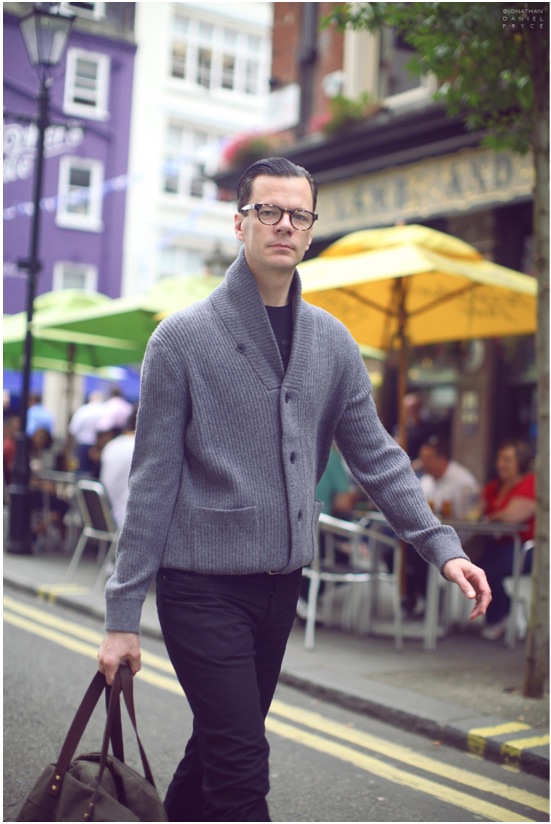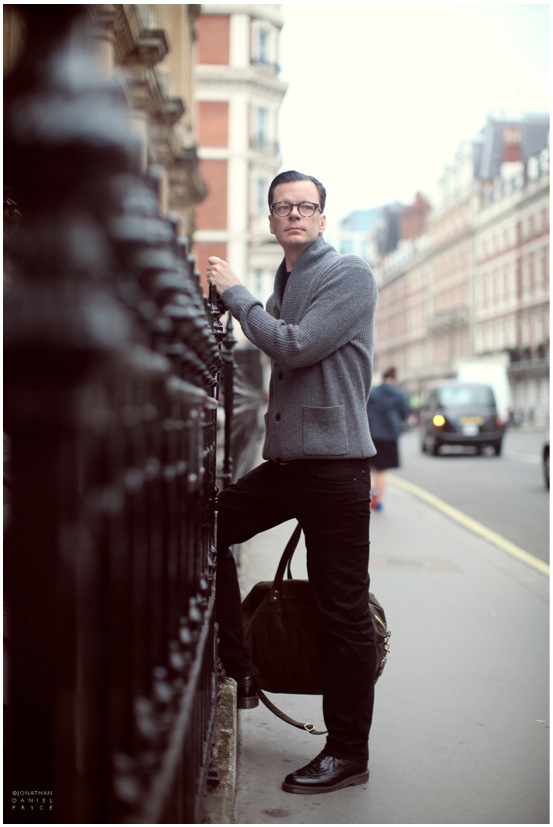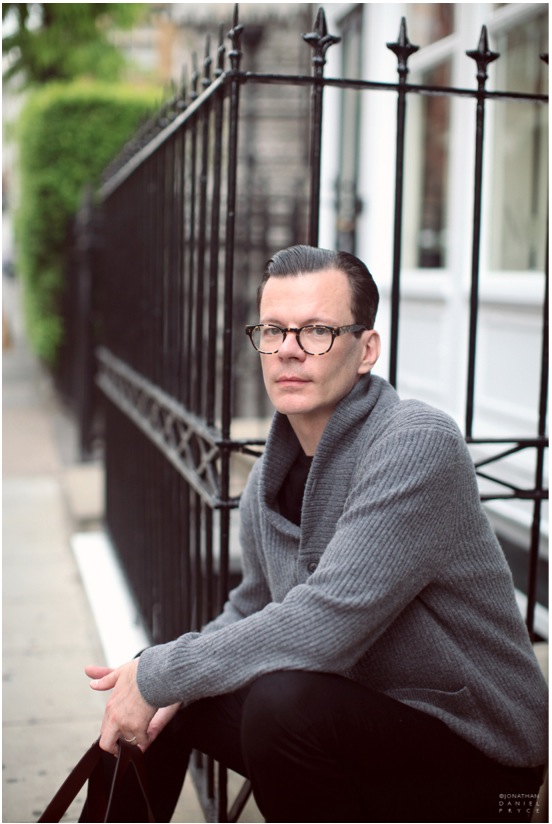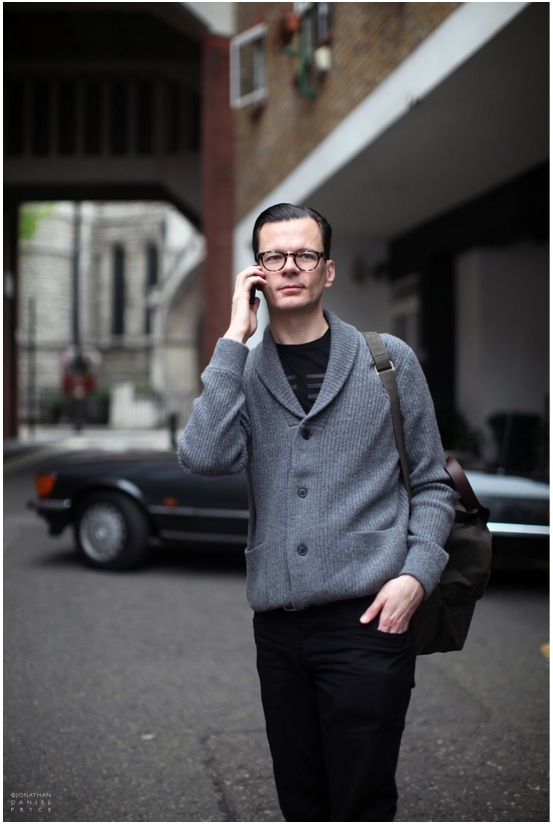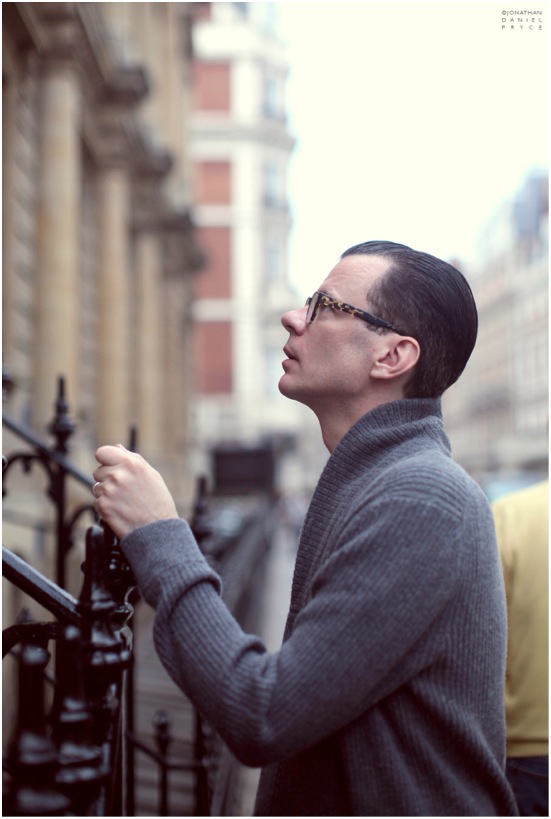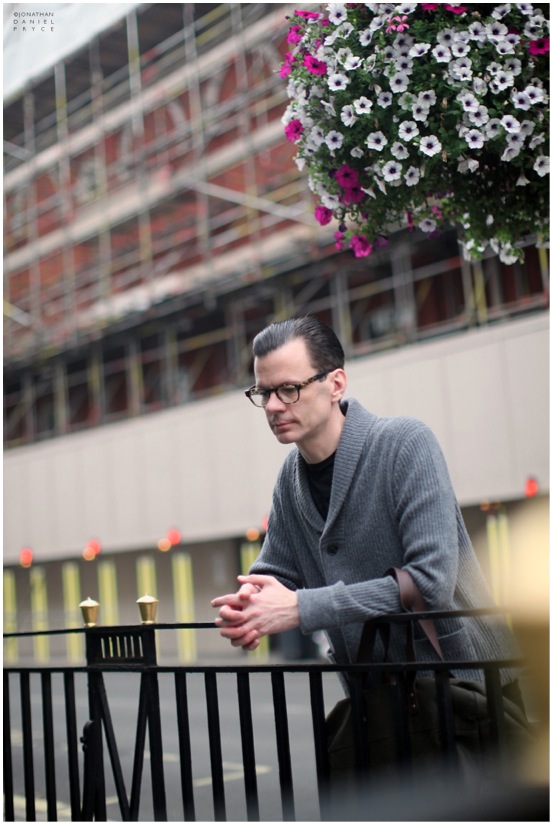GarconJon meets…Martin Belk for GQ x GAP
Mr Martin Belk is a born story-teller. Having photographed him retracing his steps around New York City’s East Village this summer for PORT Magazine, I knew he had some tales to tell. This was reinforced ten-fold with his autobiographical book Pretty Broken Punks: lipstick, leather jeans, a death of New York. One chapter in and I was hooked.
One short chat with Mr Belk is enough to realise his conversational skills are on par with the written word – unheard of for most writers. Now a London resident, we took a jaunt around Mayfair to talk about his fascinating life in New York, starting a Prison writing programme for Young Offenders and meeting the Queen. Yes, Queen Elizabeth II.
Martin wears Baldwin cardigan and tshirt with Ernest Alexander bag – available at GAP.com.
Martin Belk, Writer
Where did you grow up and where do you live now?
Born: Charlotte NC. Grew up, as in matured: New York City. Now, float between London, Glasgow and Paris.
How would you describe your job title?
Writer, publisher, observer crazy enough to believe.
What’s your star sign?
David Bowie.
When you were a child, what did you want to be when you grew up?
Freddie Mercury.
When did you realise you could write?
The same time I finally realised I had just as much right to exist as anybody else, was entitled to an opinion and a point of view and that the abusive teachers along the way who wrote ‘vivid imagination’ and ‘daydreams too much’ as report-card criticisms were inconsequential to the perpetuation of real culture. Oh, and after about 20 years of struggling with all this, until I actually had something to say.
You used to be an art director in NYC agencies – where did the change from this to writing come? Is there anything you miss about Art Direction?
I still do a lot of design work but the difference is now I can pick and choose. I reached a point of burnout with it in New York, watching an art form turn into a sweat shop schlock-fest. I’d been taught to render typography by hand. We understood ‘depth of field’ without a computer screen. Now, they teach students to use software, not design – really. I miss the early days of my career when I worked together with illustrators, photographers, typesetters, pressmen and the whole studio smelled like coffee and printers’ ink. We all had offices, with a door, and the ‘open plan’ was in our heads, reserved for creativity. We made things.
How have your past roles informed the work you do now?
Well the work in the agencies, then a couple of Wall Street IPO’s during the great internet party in the 90s, along with the first rock show we did on the net with Debbie Harry – all of this informs the way I operate today. Like it or not, there are so many people posing as creatives these days simply because they own computers, writers and artists need something tangible to say and must be an integral part of the business of saying it.
You went back to school as an adult – was that a turning point in your life? Did it alter the way you look at the world?
I’m an adult? Well, about the time I realised the bottom would fall out of the ‘net boom, about ’99 or Y2K, I knew I needed a safety net. Originally, I thought I’d just go get the degree I’d lied about having for so many years and some student grant money. But then I walked into Empire State College, part of the State University, and met a mentor, Mary Folliet, who issued me a challenge: that if I wanted to write, I could be serious if I got serious. Before they changed everything, or ruined it rather, you wrote your own degree rational and had to defend it in front of 12 academics. I went for it. She introduced me to John Calder who she knew from living in Paris – Samuel Beckett’s friend and publisher, Barney Rossett’s contemporary in the US – who became another mentor while getting my master’s degree. We are all still friends, colleagues and writers to this day.
For whatever reason, I’ve tended to do life in reverse in many cases. Having a successful career, then getting my education in this case. I don’t recommend it necessarily, but, what it tends to provide is something desperately needed to be effective: experience that informs my creative work. I rely on all of it minute by minute. Good writing is 90% observation, 9% skill and 1% opinion. Most people do that one in reverse.
You’ve lived in the UK for 8 years now – do you still feel as American as ever? What nationality do you feel an affiliation for?
I actually feel more or equally Scottish as anything else. When I arrived, there weren’t many ‘Yanks’ running around, unless they were on a tourist bus. Scotland is a rough place, but it embraced me, and even my sometimes cantankerous disposition. I love America, will never relinquish my ties to it, and it is still a land of opportunity. But the politics of the past 15 years, especially education-politics in the US terrifies me. The UK is on the corporate box-ticking bandwagon as well, and with the polar caps melting just yesterday, I honestly don’t know how we’ll see ourselves out of this one.
One thing Americans get that Europeans do not: momentum. Americans thrive on momentum, sometimes to their own detriment. But Europeans tend to spend their time doing anything and everything to thwart momentum, in some cases progress. Dickens proves right in a lot of cases today…
You’ve experienced life in many iconic of cities in the western world – New York, Edinburgh, Glasgow, London, Paris – do you think this has influenced your writing style?
Most definitely. There’s not a day I’m not grateful to think from the international perspectives of say, James Baldwin, Joan Didion or Gore Vidal. In New York my wit became pithy and loveably cynical, in Scotland my ‘O’s became round and melodic, my language aware of a Scots Gaelic vibe, and poetry is not only loved, but written by the young people. Paris opened another part of my brain with the size and shape of the language, where I can imagine in new structures. London too, if you get out of the tourist areas, provides descriptive uses of English that simply cannot be used elsewhere.
What are your top qualities for each city?
New York, although now a shopping mall for the idle rich thanks to Giuliani and Bloomberg, will teach you pace and momentum. Edinburgh will show you how to appreciate the past and your place in it, Glasgow will show you how not to look back too long. Paris has an uncanny set of traditions. The best of which: children are children: they are expected to look, dress and act like the inexperienced subordinates they are. It’s quite refreshing. My favourite thing about London is the ability for men to carry style. Beards, moustaches, precisely placed and brightly coloured accessories, refined tastes…there’s a tailored eccentricity here that’s celebrated, and sadly been lost in most of the rest of the world.
I love the subtle differences in the English language from country to country.
What are the most noticeable intricacies you’ve noticed between the US and UK?
I’ve seen it said, and indeed it’s true, Americans are not ‘loud’ they’re simply not afraid to be overheard. Conversations are perpetual, interruptions expected, as part of the excitement. I think this is a quality of any recently liberated country – it is your responsibility to contribute.
In Britain, people try desperately not to be heard, taking pains not to say something, even if the roof on fire. But strangely, Britain suffers from a case of the loudest, most obnoxious tabloid press in the world, which claims to speak for the people.
My grandfather used to tell us a story which would get himself hysterical with laughter, about after he and his army group fought their way into Berlin, they came upon British soldiers. One happy chappy in particular used to tell my grandfather some of the wildest tales, which he’d emphasize the truth and sincerity of with “I’m-tellin-ya, I’m-tellin-ya.” Currently I’m interested in the multi-purposed use of the word ‘Innit’ which can mean ‘insn’t it?’, ‘yes’, or ‘push the button you idiot and open the train doors so we can get off’.
I’ve read your latest book, Pretty Broken Punks: lipstick, leather jeans, a death of New York and it was superb. I was experiencing this personal journey first hand – the pages seemed to turn faster than anything else I’ve read. When you look back at that time, do you feel like the same person?
Yes and no. Of course it is nonfiction, memoir so I did live it – from escaping the rural south to chasing rock stars, yet it does seem a long while ago. It’s wild, reliving it every time for an interview or the like. It all turned fast like you mention the pages turn fast – and all I can say is all the ‘live for today’ clichés are completely true. Blink and 20 years’ll have passed. Joey Ramone used to talk about writing short songs, 3 minutes max. I took inspiration for the book from this. If it reads at the pace you’ve suggested, you’ll get a sense of what it was like for me.
How has the response to the book been?
Crazy. Excruciating. Intense. People who are actually in the book love it, and respect I put everything into the credibility and accuracy of the book. Having others come back and vouch for this makes me feel like I’ve accomplished something. For everyone else, I hear a lot of lamenting ‘wish I was there’ or ‘I was born too late’, to which I don’t have a big response except go create your thing. You’ve got your ‘now!’ now.
Is there anything you miss about that time in New York?
Yeah, New York. I know things change, but I’ve never before heard of such a calculated destruction of one of the most influential and cultural cities in the world in less than 20 years. Giuliani ripped the heart out of that town. Pagan, Bloomberg, Quinn and others finished the job. New York has made a paradigm shift, in the words of Dorian Corey, from a place where you go to ‘create’, to a place you go to ‘acquire.’
Do you consider yourself a nostalgic person or was the book a simple documentation of life?
What I am both most proud of and sad about is that I managed to capture a laundry list of things that are no longer there, in a real time with real people and real life happening. I think this is my job as a writer. I’ve never understood somebody who reads about some place on a Wikipedia page and then writes a bestseller about a place they’ve never been to. If getting things right, writing what I know, actually know, and holding up a mirror is nostalgia – so be it.
The publishing industry has changed massively in the past few years – what do you think this is exciting or opening the floodgates to mediocre work?
What opened the floodgates to mediocre work a long time ago are publishers who’ve never read a book, writers who’ve never left their hometown, agents who become convinced that they are the true talent and retailers who have entirely replaced literary talent with celebrity. That said, I think these and other cracks are showing in the tired old system, in the form of writers who take responsibility for their work and take it forward. As for me – while most play office politics at wine and cheese receptions, I’m selling books – and a well-reviewed, good one at that.
Paper or Plastic: If you had the choice would you prefer a printed book or an e-reader? Why?
Before any of this the word was spoken and conveying a story was storytelling. Not acting, not directing – the actual telling of a story. Books, e-readers, smoke signals, it’s all the same to me. I think it’s becoming clear that the e-readers have opened a new audience, as opposed to competing with the paper book readers. I’m excited for both. The problem is that, the public is still under the illusion that anything electronic needs to be free, and the distributors are still under a delusion that they deserve 90% of the profits from work they did nothing to create and do little to promote. I hope it all comes out in the wash. But a word to the wise: paper doesn’t crash.
You do creative writing across a number of genres, but some of the most intriguing is your work with young offenders. How did this come about? Did anyone inspire you to take this route?
I once wrote a detailed article about all this in the Scottish Review of Books, but some of my influence was certainly Beckett’s experience via Calder with ‘Waiting for Godot’ performed at San Quentin prison. After getting my masters degree I wanted something meaningful to do as a next step. I saw some people taking writer-residencies at colleges and such, but at the time had little interest in dealing with more ‘school writers’. I saw a program on TV which featured the boys in the jail. One boy, perpetually in trouble, had his officer-carer ask him in a desperate, candid moment “what do you want to do in life?” to which he responded “no one’s ever asked me that before”. Bells went off in my head – having done a lot of Theatre-in-Education and community development work in NYC. I fired off a letter to the prison governor the next day, “I’ve got an idea…” I got a response a week later “How soon would you like to get here”. That was over six years ago. Since, I’ve had positive hat-tipping from First Minister Alex Salmond and even was served cake and tea at Holyrood Palace by Her Majesty the Queen.
It must be a humbling experience – has this changed your political or sociological views?
Working in the jail has been one of the most rewarding experiences of my career. You want to know about life? Sit in a room full of teenaged murderers and help them write their stories. Listen. A lot. Only one boy I dealt with ever said ‘I didn’t do it’ and was actually later exonerated. The rest take full responsibility, and we start there. I’m not so much interested in their actual crimes, but the context of how they got where they are and where they want to go. I take a lot of cues from the Black Civil Rights movement in America. Us versus Them. The system. “This innocent country set you down into a ghetto, in which, in fact, it intended you should perish” – James Baldwin. The boys respond amazingly. We’ve read Kafka, and they get it. Metamorphosis.
My views have not changed, per se, but my experience in the jail has given me the content I need to continue to lay some of the blame for society’s ills squarely at the feet of the farce that is primary education in the West, and the cancer that is pop-culture and media. We’ve got one, working on two generations of kids who think MTV is culture and have little or no historical or real political context of the world they live in. Experts have warned that mobile phones short-circuit the brains of young people. All I know to do is go teach in a jail, where they don’t have any.
Your style seems to be quite smart – I’ve hardly seen you in anything other than black and grey. How would you describe your style?
I’m with Tim Gunn on this one: most men, especially in America, wear their clothes too big. I’d go a step further and say, in general, they look like over-feminized schlubs and I don’t mean effeminate/gay/straight. If you’re going to have an opinion, something to say, you have to carry it with dignity. I write in black ink, I consider the spaces ‘between the lines,’ the grey areas, paramount. I start there. I’d rather be perpetually over dressed or smart as you say, than a clown in a baggy onesie. What have we become? A society of comfort-crazed, overgrown children, with our hoodies, booties, track suits all complete with a baby bottle full of filtered water and smart phones for a rattle. PsychoTherapists should be having a field day.
What’s an average day like for you?
Waking up, working on manuscripts and creative work. Not touching an email or phone beforehand, else the day is lost. Commitment is key.
What’s the most challenging thing about your work?
Combatting the parochial, outdated systems that prevent new voices from being heard.
What do you like most about your work?
I love getting in front of people and teaching, performing or engaging debate. I’m a storyteller at heart.
What’s on the horizon for Mr Belk?
A stage adaptation of Pretty Broken Punks, an online launch with radio plays, a US monologue tour, and three new books, one of which is entitled How to go to Jail and not get Stuck.
Finally, leave us with some words of wisdom…
Write what you know, the rest is just news.
©2013 Garconjon.com, GQ/Gentlemen’s Quarterly

